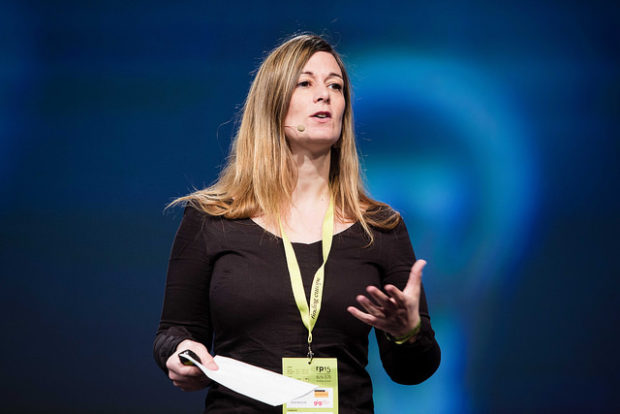3 Reasons to Start Speaking at Industry Conferences

The following is a guest post by Brendan Alan Barrett. His bio follows.
In the National Association of Colleges and Employers’ 2016 Job Outlook Survey, 80% of employers said they want to see evidence of leadership skills on a candidate’s resume. Phrased less subtly, they want to see evidence of thought-leadership.
If there was a day when positional leadership was a sufficient means of managing a team, that day is far behind us. True leadership is built on trust and winning buy-in from colleagues through proof of foresight and competence as a decision maker.
Leadership Status
According to veteran communications strategist Aurora Gregory, “Nothing demonstrates leadership and expertise more than speaking in front of your industry peers.”
Not only does public speaking give you a platform for demonstrating your expertise in the field, it serves as a differentiator between you and those of your peers that won’t willingly venture from their comfort-zone.
Aurora, whose career in marketing communications has included roles with Nestlé USA, Burson-Marstellar, and Fleishman Hillard, says that this kind of differentiation is, “So important when you are early in your career and trying to establish your personal brand… [It] gives you a leg up.”
A firm believer that speaking at conferences can position someone as a leader and expert, while also rapidly expanding their network, Aurora wrote the book on landing gigs as a speaker. More precisely, she co-authored the Amazon best-seller on the topic, Get Picked: Tips, Tricks and Tools for Creating an Irresistible Speaker Proposal.

Brand Amplification
Echoing Aurora’s point on personal branding is Tasha Moffitt, Executive Director to The Wahl Group. Tasha says, “If you have a message to share and are interested in getting it out there to a larger audience, speaking at a conference is one of the best ways to amplify your brand.”
Tasha, whose husband Erik Wahl is the artist and speaker known for the The Art of Vision, oversees the business end of The Wahl Group. As described by Erik, “She is a relationship genius,” and one of the sharpest business women he’s ever met.
Tasha recommends that first time speakers, “Start by researching events in your area that would be interested in your expertise. If your area of expertise is education— Google local education events or associations. Start asking questions. Find out if they have meetings. If they do, find out if they are interested in outside speakers.”
While simple, this methodology is how new speakers can land introductory speaking appearances. These can help a professional build up a catalog of photos and videos specific to their speaking experience. Those materials can then be leveraged in securing more high-profile speaking opportunities.
“It’s important to have 4 or 5 different events to pull from. Once you have built up some street credential and have professionals who will recommend you, you can start researching paid events,” says Tasha.
It Pays
Did Tasha say ‘paid events?’ Like an event in which the meeting planner will cut you a check for presenting to their attendees?

Exactly.
Establishing yourself as an industry leader and amplifying your personal brand or the brand of your employer is likely to provide you with opportunities to make more money. This can come in the form of a promotion based on your recently demonstrated leadership qualities, bonuses from attracting new business to your firm, or competitive offers from other potential employers.
The example of Neen James however, makes it very clear that speaking is a business all on its own.
“If you feel called to speak, and share your message; conferences and events are a great venue to share your message with the audience you want to serve,” explains Neen, who makes her living by collecting fees as a keynote speaker.
Message, Market, And Delivery
Neen’s advice to other women who want to make money as a speaker is that, “You need to understand your message, market, and the best way to deliver [value].”
Most professional speakers get their start by speaking free of charge. The exceptions to this rule are typically celebrities or best-selling authors that pursue keynote speaking opportunities.
Julie Austin on the other hand, is not a celebrity. Nor was she well-known as a presenter when she started generating revenue as a speaker. She did however, have sponsors.
According to Julie, having a sponsor can curb a speaker’s impulse to sell products or services from the stage in a manner that might intrude on the content of the presentation. “This is what speakers tend to do if they aren’t getting paid to speak. It’s only natural since they aren’t getting financial compensation,” she explains.
Like having signage in the room or saying a quick thank-you, sponsorship can be a way of compensating speakers without casting a shadow over the content of their presentation. It can make the exchange between attendees, meeting planners, and speakers beneficial all the way around.
To help other speakers cover their expenses and actually generating income from speaking engagements that don’t pay, Julie founded Speaker Sponsor, a directory that matches speakers with sponsorship.
There’s much more to learn about speaking professionally. And there’s an upcoming follow-up to this article that will help with the next steps to profitable public speaking . Watch for it!
ABOUT THE AUTHOR:
Brendan Alan Barrett, writes about professional development at www.StartInPhx.com, a blog dedicated to the mission of career success without student-debt. Brendan is also the author of READ WRITE DO Professional Development and Career Success Playbook, a book written for people who are ready to pursue the career they’ve always wanted.
Image credits


